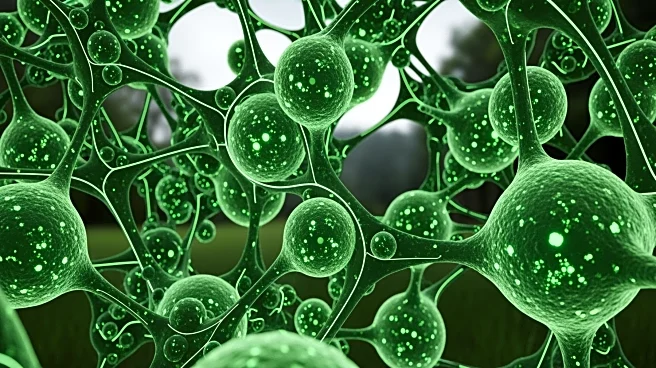What's Happening?
Researchers have developed engineered living materials (ELMs) using bacterial spores, which could revolutionize sustainability efforts. The study, published in Science Advances, highlights the use of Bacillus
spores embedded within ELMs to create materials that can endure harsh environments and perform specific tasks. These materials have potential applications in detecting disease biomarkers, breaking down environmental pollutants, and functioning as self-healing composites. The research team combined two bacterial species, Komogataeibacter rhaeticus and Bacillus subtilis, to fabricate the material. K. rhaeticus produces strong bacterial cellulose fibers, while Bacillus contributes its spore-forming capacity. The genetic modification of the spores enhances their binding to the cellulose, creating a robust living material.
Why It's Important?
The development of ELMs with bacterial spores represents a significant advancement in sustainable materials science. These materials could replace fossil-based materials, such as plastics, in various applications, promoting environmental sustainability. The ability of these materials to self-heal and perform tasks on demand could lead to innovations in construction, healthcare, and environmental management. By providing a sustainable alternative to traditional materials, ELMs could reduce reliance on non-renewable resources and decrease environmental impact. The research underscores the potential for biotechnology to address global sustainability challenges.
What's Next?
Before ELMs can be widely adopted, their performance and long-term stability must meet existing material standards. The research is currently at a proof-of-concept stage, and further development is needed to ensure these materials can match the strength and durability of conventional building materials. Researchers aim to gradually replace unsustainable materials with living, self-sustaining ones, paving the way for broader applications in various industries. Continued research and development will focus on enhancing the functionality and resilience of ELMs for real-world use.
Beyond the Headlines
The use of bacterial spores in ELMs highlights the innovative approach of leveraging natural processes for material science. This development could lead to ethical and cultural shifts in how materials are produced and used, emphasizing sustainability and environmental responsibility. The ability to program materials to perform specific tasks on demand could transform industries and lead to new ethical considerations regarding the use of living organisms in material production.











